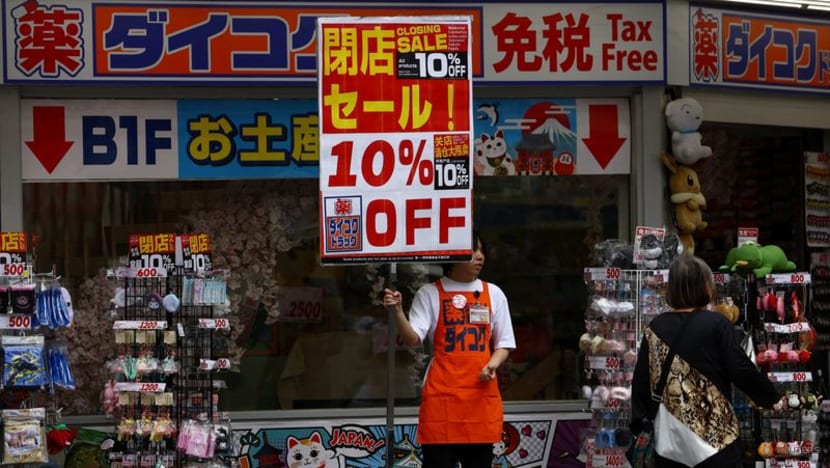Japan's Q1 GDP contraction narrows on consumption improvement, revised figure shows

FILE PHOTO: A store staff member tries to attract customers outside a store in Tokyo, Japan, May 15, 2025. REUTERS/Issei Kato/File photo
TOKYO :Japan's economy contracted less than initially estimated in the January-March quarter, government data showed on Monday, with consumption figures revised upwards at a time when uncertainty surrounding U.S. tariffs is clouding the outlook.
Gross domestic product shrank an annualised 0.2 per cent in the three months through March 31, showed revised data from the Cabinet Office, rather than 0.7 per cent announced on May 16 which matched economists' median forecast.
Versus the previous quarter, the revision translates as flat in price-adjusted terms compared with an initially estimated 0.2 per cent contraction.
The revision does little to allay analyst concern that economic growth was losing momentum even before U.S. President Donald Trump implemented his so-called reciprocal tariffs on April 2.
"It wasn't a revision that changed our view on the overall economy," said economist Uichiro Nozaki at Nomura Securities.
Private consumption, which accounts for more than half of Japan's economy, grew 0.1 per cent, versus flat in the initial reading. Contributing to the revision was the inclusion of restaurant and games sales data which has since become available.
The capital expenditure component of GDP, a barometer of private demand-led strength, expanded 1.1 per cent in the first quarter, revised from 1.4 per cent. Economists had estimated 1.3 per cent.
An upward revision in private inventory contributed to reducing the degree of contraction in the overall figure, the government said.
External demand, or exports minus imports, knocked 0.8 per centage point off growth, as in the initial reading. Conversely, domestic demand contributed 0.8 per centage point.
Japan faces a 24 per cent U.S. tariff from July unless it can negotiate a lower rate. With automobile-related companies comprising Japan's biggest industry, the government is also seeking an exemption for Japan's automakers from a 25 per cent tariff.
"In terms of the April-June quarter and beyond, there are a number of concerns, such as worries about exports and weak domestic demand," said economist Kazutaka Maeda at Meiji Yasuda Research Institute.
"It is unclear how the tariff negotiations will turn out, but given the scale of the automotive industry, it will be difficult for the U.S. to back down easily, meaning the talks will be quite difficult."
Policymakers and analysts are concerned that trade tension unleashed by U.S. tariffs may complicate the Bank of Japan's efforts to normalise monetary policy.
The central bank is set to hold a two-day policy meeting early next week.
Monday's revised data is not likely to have much influence on the meeting outcome, said Nomura's Nozaki. The BOJ is more concerned about tariff negotiations and their impact on exports and the overall economy once they are concluded.
"For the BOJ, the basic approach to assessing the economy will be to monitor both the immediate data and the status of negotiations" to make policy decisions, Nozaki said.













